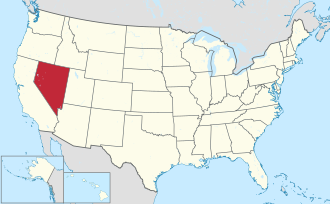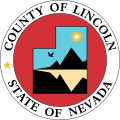2000 census
As of the census [14] of 2000, there were 4,165 people, 1,540 households, and 1,010 families living in the county. The population density was less than one person per square mile (and less than 1/km2). There were 2,178 housing units at an average density of 0 per square mile (0/km2). The racial makeup of the county was 91.50% White, 1.78% Black or African American, 1.75% Native American, 0.34% Asian, 0.02% Pacific Islander, 2.69% from other races, and 1.92% from two or more races. 5.31% of the population were Hispanic or Latino of any race.
According to the 2000 census the five largest ancestry groups in Lincoln County are English (21%), German (18%), Irish (11%), Mexican (4%) and Italian (4%).
There were 1,540 households, out of which 29.00% had children under the age of 18 living with them, 56.20% were married couples living together, 7.90% had a female householder with no husband present, and 34.40% were non-families. 31.30% of all households were made up of individuals, and 16.10% had someone living alone who was 65 years of age or older. The average household size was 2.48 and the average family size was 3.15.
In the county, the population was spread out, with 30.10% under the age of 18, 6.00% from 18 to 24, 21.90% from 25 to 44, 25.90% from 45 to 64, and 16.20% who were 65 years of age or older. The median age was 39 years. For every 100 females there were 107.90 males. For every 100 females age 18 and over, there were 108.20 males.
The median income for a household in the county was $31,979, and the median income for a family was $45,588. Males had a median income of $40,048 versus $23,571 for females. The per capita income for the county was $17,326. About 11.50% of families and 16.50% of the population were below the poverty line, including 19.60% of those under age 18 and 17.40% of those age 65 or over.
2010 census
As of the 2010 United States census, there were 5,345 people, 1,988 households, and 1,282 families living in the county. [15] The population density was 0.5 inhabitants per square mile (0.19/km2). There were 2,730 housing units at an average density of 0.3 per square mile (0.12/km2). [16] The racial makeup of the county was 91.1% white, 2.3% black or African American, 1.1% American Indian, 0.7% Asian, 0.3% Pacific islander, 2.2% from other races, and 2.3% from two or more races. Those of Hispanic or Latino origin made up 6.2% of the population. [15] In terms of ancestry, 39.8% were English, 19.5% were German, 12.4% were Irish, 6.1% were Danish, 5.9% were Dutch, and 1.8% were American. [17]
Of the 1,988 households, 28.9% had children under the age of 18 living with them, 53.0% were married couples living together, 7.7% had a female householder with no husband present, 35.5% were non-families, and 30.4% of all households were made up of individuals. The average household size was 2.57 and the average family size was 3.16. The median age was 39.9 years. [15]
The median income for a household in the county was $44,695 and the median income for a family was $56,167. Males had a median income of $51,475 versus $26,366 for females. The per capita income for the county was $18,148. About 7.5% of families and 10.6% of the population were below the poverty line, including 12.5% of those under age 18 and 9.6% of those age 65 or over. [18]







